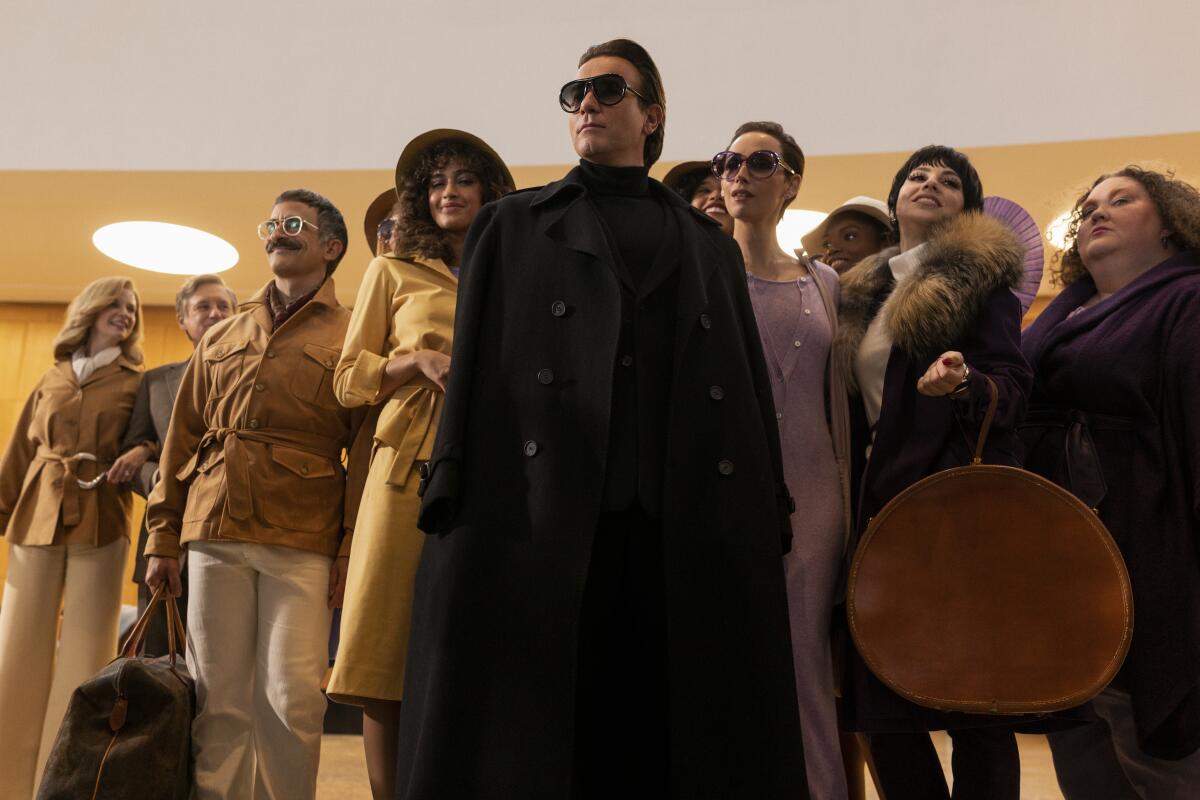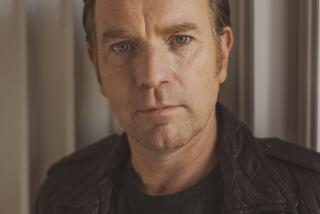Ewan McGregor on Halston: ‘I think we would’ve been fast friends. I really do.’

He’s fought Darth Vader, shot heroin in seedy bathrooms and spent some time on the shady side of “Fargo.” So how does Ewan McGregor go on to step into the refined world of couture with the Netflix limited series “Halston”?
“I needed someone with acting chops — intensity, fearlessness and mastery,” says series director and executive producer Daniel Minahan. “Ewan has all that, plus a natural élan and matinee idol good looks. Halston was a complex, self-invented persona who — besides speaking in a made-up patrician dialect — was not always the most warm and fuzzy guy. I knew Ewan would approach him with his customary empathy and enthusiasm. It was truly the high point of my career to get to watch him create this character.”
McGregor recently spoke with The Envelope about slipping into Roy Halston Frowick’s loafers, Liza Minnelli and his single most painful scene to perform.
Not knowing anything about Halston, what attracted you to this role?
“His photographs” is the short answer. Dan met me to talk about this project and showed me some of the most amazing photographs of Halston. I wanted to play him from the way he was in those photographs — the way he held himself, the persona he embodied; there was something about the steely, slight coldness in his eyes. I thought, “Oh, this is an interesting man to play.” And I was right!
When did how to play him click?
It’s a process. He was ever-changing, because we were playing him through the years. I was always mindful about where he was in his life and his addiction. But putting his clothes on … [costume designer Jeriana San Juan] made the most extraordinary costumes. At the end of Episode 1 — where I put on the black turtleneck, slick my hair back and put on the bronzer — that’s probably the moment where I felt, “OK, this is right. I know this Halston.”
How are you and he similar, different?
Oh, wow! Massively different. I don’t see very much commonality. I’m not really a perfectionist, although I strive to be. I’m creative, like Halston was. I’m very serious and passionate about it, but I’m not the leader. I work as a team, and Halston was a leader. He had people working for him to create his idea, whereas I work with people to make something in a more shared way.
I’m not a screamer and a shouter. I hate losing my temper. I mean, I have, of course, but it makes me feel sick when I do, whereas Halston seemed quite happy with it [laughs].
What responsibility did you feel?
I felt a huge responsibility to the people who knew and loved him. I felt a massive responsibility to Liza Minnelli, because I knew — from all my research, my reading and loads of photographs of them together — this was one of the great friendships. I felt a terrible responsibility to get him right for her. Also, a lot of people like myself didn’t know Halston, and I felt, “Well, if I’m going to tell people about this man, I’ve got a responsibility to get him right.” There was an added pressure there.
Your most challenging scene?
Once I got in his shoes and felt like him, it all was just a joy to play. I didn’t have a scene that I got stuck in, or a relationship I didn’t understand.
There were some painful scenes to play. The scene where he lays into Joe Eula in his living room — he’s so horrible to him. But I loved working with David Pittu, who’s so real in his work. I felt like I was hurting him with my words, which wasn’t pleasant, but it was an amazing scene to play as two actors.
Let’s talk about those sex scenes.
Someone’s sexual life and world are a very important part of who they are. That’s just how I’ve always thought about playing anyone. I’m playing Halston, who is gay. It’s an important part of who he was — and I don’t deny that — but it’s just one part of what makes him him. For me, as an actor exploring a character, it’s important to try and fill all that out.
The odd thing about the sexual scenes in “Halston” is that Halston’s sexual life was very private — at least until the press exposed him. Before the Studio 54 days, he would rarely be out beyond 10:30. He would go for dinner or drinks with people, then he would go home, a rent boy would come over, he’d sleep with him, the rent boy would leave, and Halston would go to sleep. It was quick. Private. Showing that felt to me like a small betrayal of Halston. But if you’re going to tell the story of a man, you’ve got to tell the whole story. I think we did it tastefully. I hope so, anyway.
The Halston Archives and family aren’t happy. What do you hope Roy would think?
I’m sad the family are upset, I really am, because I thought we did a nice job of telling his story with great respect. I never knew him, and I can only imagine, but I rather think he might have liked that we were making his story, that we had fun with it, that there was some silliness in it. We showed his passion and his genius.
I often [pictured] him standing at the monitor, looking over Dan’s shoulder, excited that we were telling a part of his life.
What would you say to him now?
I think we would’ve got on very well, me and Roy. I think we would’ve been fast friends. I really do.
More to Read
From the Oscars to the Emmys.
Get the Envelope newsletter for exclusive awards season coverage, behind-the-scenes stories from the Envelope podcast and columnist Glenn Whipp’s must-read analysis.
You may occasionally receive promotional content from the Los Angeles Times.










